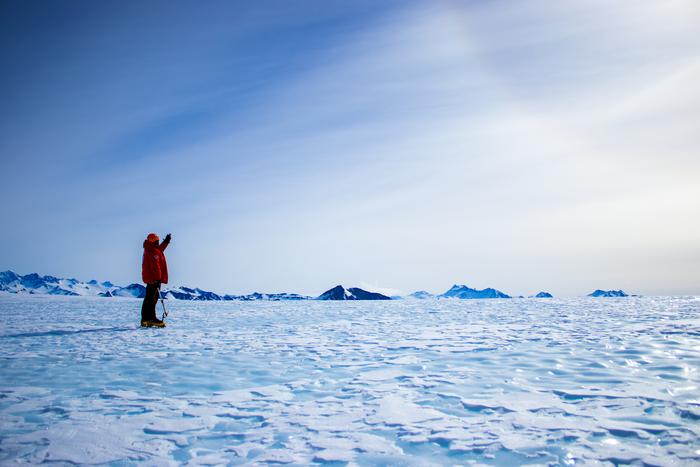Using artificial intelligence, satellite observations, and climate model projections, a team of researchers from Switzerland and Belgium calculate that for every tenth of a degree of increase in global air temperature, an average of nearly 9,000 meteorites disappear from the surface of the ice sheet. This loss has major implications, as meteorites are unique samples of extraterrestrial bodies that provide insights into the origin of life on Earth and the formation of the Moon.

Credit: Veronica Tollenaar, Université libre de Bruxelles
Using artificial intelligence, satellite observations, and climate model projections, a team of researchers from Switzerland and Belgium calculate that for every tenth of a degree of increase in global air temperature, an average of nearly 9,000 meteorites disappear from the surface of the ice sheet. This loss has major implications, as meteorites are unique samples of extraterrestrial bodies that provide insights into the origin of life on Earth and the formation of the Moon.
Disappearing at an alarming rate
By 2050, about a quarter of the estimated of 300,000 – 800,000 meteorites in Antarctica will be lost due to glacial melt. By end of the century, researchers anticipate that number could rise approaching a loss of meteorites closer to three-quarters of the meteorites on the continent under a high-warming scenario.
Published in the journal Nature Climate Change, Harry Zekollari co-led the study while working under Professor Daniel Farinotti in the Laboratory of Hydraulics, Hydrology and Glaciology at the Department of Civil, Environmental and Geomatic Engineering at ETH Zurich. Zekollari and co-lead Veronica Tollenaar, Université Libre de Bruxelles, reveal in the study that ongoing warming results in the loss of about 5,000 meteorites a year, outpacing the collection efforts of Antarctic meteorites by a factor five.
Meteorites – time capsules of the universe
Zekollari, now an Associate Professor of Glaciology at Vrije Universiteit Brussel, calls for a major international effort to preserve the scientific value of meteorites, “We need to accelerate and intensify efforts to recover Antarctic meteorites. The loss of Antarctic meteorites is much like the loss of data that scientists glean from ice cores collected from vanishing glaciers – once they disappear, so do some of the secrets of the universe.”
Meteorites are fragments from space that provide unique information about our solar system. Antarctica is the most prolific place to find meteorites, and to date, about 60 percent of all meteorites ever found on Earth have been collected from the surface of the Antarctic ice sheet. The flow of the ice sheet concentrates meteorites in so-called “meteorite stranding zones”, where their dark crust allows them to be easily detected. In addition to intensifying recovery operations, there is potential to increase the efficiency of meteorite recovery missions in the short term. This potential relies mainly on data-driven analysis to identify unexplored meteorite stranding zones and mapping areas exposing blue ice where meteorites are often found.
Extraterrestrial heritage slipping away
Due to their dark colour, meteorites preferentially heat up with respect to the surrounding ice. As this heat transfers from the meteorites to the ice, it can warm up the ice, and eventually cause the ice to locally melt, leading to a sinking of meteorites underneath the surface of the ice sheet. Once the meteorites enter the ice sheet, even at shallow depths, they cannot be detected anymore, and they are thus lost for science.
As atmospheric temperatures increase, so does the surface temperature of the ice, intensifying the loss. “Even when temperatures of the ice are well below zero, the dark meteorites warm-up so much in the sun that they can melt the ice directly beneath the meteorite. Through this process, the warm meteorite creates a local depression in the ice and over time fully disappears under the surface,” says Tollenaar.
Scientists conclude that in the long-term, the only way to preserve most of the remaining unrecovered Antarctic meteorites is to rapidly reduce greenhouse gas emissions.
Journal
Nature Climate Change
Method of Research
Computational simulation/modeling
Subject of Research
Not applicable
Article Title
Antarctic meteorite archives threatened by climate warming
Article Publication Date
8-Apr-2024



